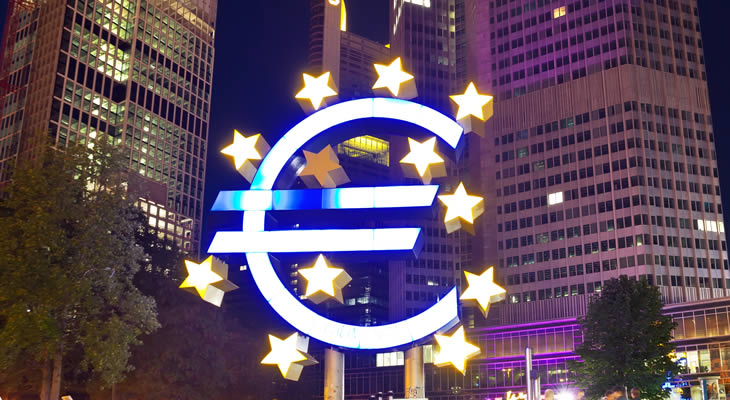The Euro to British Pound (EUR/GBP) and Euro to US Dollar (EUR/USD) exchange rates were both trending higher in Thursday’s European session while the Euro to New Zealand Dollar (EUR/NZD) exchange rate fell after the Reserve Bank of New Zealand (RBNZ) interest rate decision.
The Euro hit 12-year lows against the US Dollar (EUR/USD) and seven-year lows versus the British Pound (EUR/GBP) this week as the European Central Bank began a period of quantitative easing (QE) and tensions between Greece and its creditors heightened.
Thursday morning saw the Euro reclaiming some losses versus the British Pound, but UK Trade Balance data printed favourably and the UK currency managed to take back some ground.
The UK trade deficit narrowed from 2.14 billion to only 616 million in January—a result of falling oil prices and a strengthening services sector.
Additionally, Bank of England (BoE) Governor Mark Carney is scheduled to speak in Sheffield later in Thursday’s session and could offer further support to the British Pound exchange rate if his comments are favourable.
The BoE Governor has made some rather hawkish statements regarding UK monetary policy of late—a refreshing change amid a backdrop of a global slowdown and interest rate cuts.
Currently, the Bank of England is in the running to be one of the only central banks this year to hike rates—the Federal Reserve is also forecast to increase borrowing costs in June.
Federal Reserve Rate Hike Speculation Boosts US Dollar (USD) Exchange Rate
The US Dollar has strengthened as a result of central bank speculation and Federal Reserve officials have commented that they feel that the rate hiking cycle should begin soon.
Dallas Federal Reserve President Richard Fisher began this week’s hawkish Fed statements by suggesting that the central bank should move to increase borrowing costs in the near future to enable a gradual curvature in rises rather than a steep sharp upswing.
St Louis Federal Reserve President James Bullard was next to join this week’s hawkish chorus commenting: ‘We are a little bit too late in this process [of hiking interest rates].’
Bullard went on to comment on US inflation figures, saying: ‘Those kinds of readings on the economy are not sufficient to rationalise the zero policy rate.’
Bullard also commented on the recent increase in the US Dollar exchange rate and concerns over the strength the currency could have on businesses and the economy.
Bullard continued: ‘This has been quite a big move in the Dollar so I can understand some of the consternation. The bottom line is we have a flexible exchange rate system.’
‘We are trying to run the best monetary policy for the United States that we can. We are going to let the exchange rate go where it needs to go to equilibrate international markets.’
The New Zealand Dollar exchange rate recorded gains on Thursday after the Reserve Bank of New Zealand (RBNZ) announced it was keeping the interest rate at 3.50% and would keep the official cash rate stable for up to two years.
However, RBNZ Governor Graeme Wheeler commented that the New Zealand Dollar was still too high.
Wheeler said: ‘A substantial downward correction in the real exchange rate is needed to put New Zealand’s external accounts on a more sustainable footing.’
Euro Exchange Rate Forecast: EUR/GBP, EUR/USD, EUR/NZD
Eurozone Industrial Production rose by 1.2% in January on the year after December’s -0.2% and forecasts of 0.1%.
However, ECB officials are expected to speak over the next few days which could influence the Euro exchange rate significantly.
The Euro to US Dollar (EUR/USD) exchange rate is residing at 1.0606. The Euro to New Zealand Dollar (EUR/NZD) exchange rate is reaching 1.4323. The Euro to British Pound (EUR/GBP) exchange rate is trending in the region of 0.7072.

